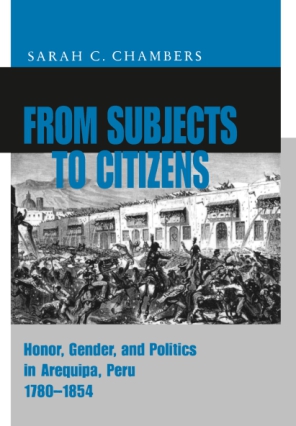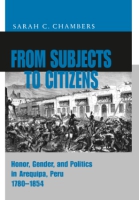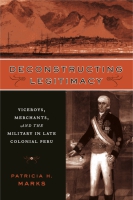
From Subjects to Citizens
Honor, Gender, and Politics in Arequipa, Peru, 1780–1854
Sarah C. Chambers
From Subjects to Citizens
Honor, Gender, and Politics in Arequipa, Peru, 1780–1854
Sarah C. Chambers
“Chambers sets new standards for the incorporation of gender into the examination of the debates and struggles over postcolonial Peru. Moreover, she has written a readable book that moves back and forth from the city to the countryside with enjoyable and worthwhile forays into festivals, legal trials, and the domestic sphere. She broadens the definition of ‘lo político’ while at the same time providing a solid regional history.”
- Description
- Reviews
- Bio
- Subjects
Honor, underpinning the legitimacy of Spanish rule and a social hierarchy based on race and class during the colonial era, came to be an important source of resistance by ordinary citizens to repressive action by republican authorities fearful of disorder. Claiming the protection of their civil liberties as guaranteed by the constitution, these "honorable" citizens cited their hard work and respectable conduct in justification of their rights, in this way contributing to the shaping of republican discourse. Prominent politicians from Arequipa, familiar with these arguments made in courtrooms where they served as jurists, promoted at the national level a form of liberalism that emphasized not only discipline but also individual liberties and praise for the honest working man.
But the protection of men's public reputations and their patriarchal authority, the author argues, came at the expense of women, who suffered further oppression from increasing public scrutiny of their sexual behavior through the definition of female virtue as private morality, which also justified their exclusion from politics. The advent of political liberalism was thus not associated with greater freedom, social or political, for women.
“Chambers sets new standards for the incorporation of gender into the examination of the debates and struggles over postcolonial Peru. Moreover, she has written a readable book that moves back and forth from the city to the countryside with enjoyable and worthwhile forays into festivals, legal trials, and the domestic sphere. She broadens the definition of ‘lo político’ while at the same time providing a solid regional history.”
“This is a very important book that deserves a broad readership among historians of both late colonial and early national periods. The research is impressive, the argument compelling, and the writing clear.”
“In From Subjects to Citizens: Honor, Gender, and Politics in Arequipa, Peru, 1780–1854, Sarah Chambers skillfully examines the question of republican virtue and political culture in Arequipa, Peru in terms of what she calls the dialectic of elite and plebeian honor codes.”
“Each of the books reviewed here makes important, individual contributions to the field of social history.”
“Sarah Chambers’s From Subjects to Citizens: Honor, Gender, and Politics in Arequipa, Peru, 1780–1854 smartly challenges the notion that ideas of citizenship originate with the propertied classes and trickle down to the ranks of the poor.”
Sarah C. Chambers is Assistant Professor of History at the University of Minnesota.
Also of Interest
Mailing List
Subscribe to our mailing list and be notified about new titles, journals and catalogs.




